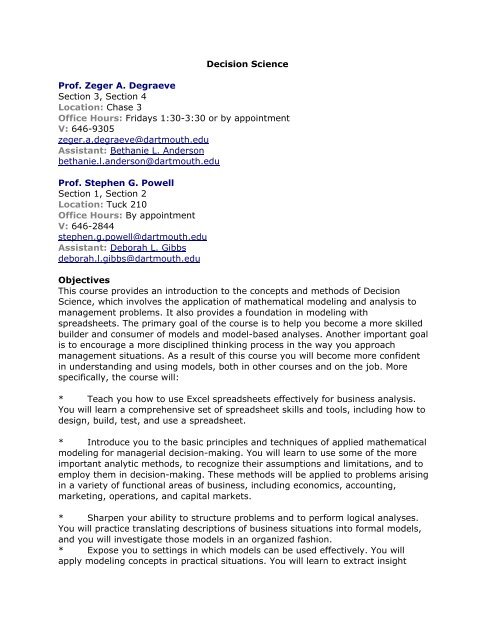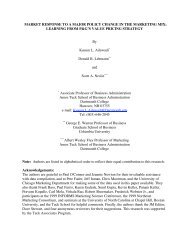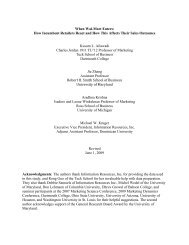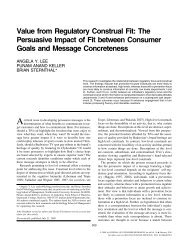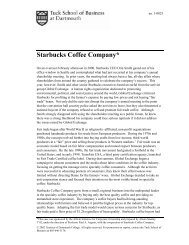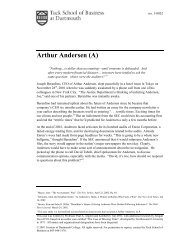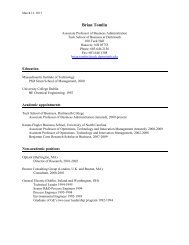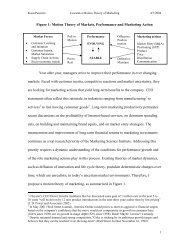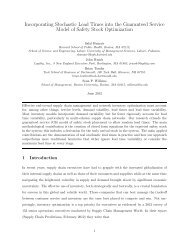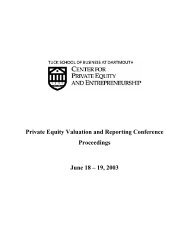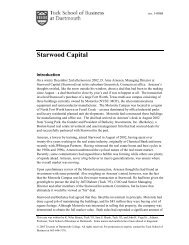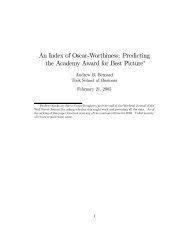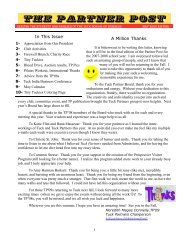Decision Science Decision Science - Mba Tuck Dartmouth
Decision Science Decision Science - Mba Tuck Dartmouth
Decision Science Decision Science - Mba Tuck Dartmouth
You also want an ePaper? Increase the reach of your titles
YUMPU automatically turns print PDFs into web optimized ePapers that Google loves.
<strong>Decision</strong> <strong>Science</strong><br />
<strong>Decision</strong> <strong>Science</strong> (DECSI), Sect 1, Fall 2002yllabus updated Dec<br />
Prof. Zeger A. Degraeve<br />
Section 3, Section 4<br />
Location: Chase 3<br />
Office Hours: Fridays 1:30-3:30 or by appointment<br />
V: 646-9305<br />
zeger.a.degraeve@dartmouth.edu<br />
Assistant: Bethanie L. Anderson<br />
bethanie.l.anderson@dartmouth.edu<br />
Prof. Stephen G. Powell<br />
Section 1, Section 2<br />
Location: <strong>Tuck</strong> 210<br />
Office Hours: By appointment<br />
V: 646-2844<br />
stephen.g.powell@dartmouth.edu<br />
Assistant: Deborah L. Gibbs<br />
deborah.l.gibbs@dartmouth.edu<br />
Objectives<br />
This course provides an introduction to the concepts and methods of <strong>Decision</strong><br />
<strong>Science</strong>, which involves the application of mathematical modeling and analysis to<br />
management problems. It also provides a foundation in modeling with<br />
spreadsheets. The primary goal of the course is to help you become a more skilled<br />
builder and consumer of models and model-based analyses. Another important goal<br />
is to encourage a more disciplined thinking process in the way you approach<br />
management situations. As a result of this course you will become more confident<br />
in understanding and using models, both in other courses and on the job. More<br />
specifically, the course will:<br />
* Teach you how to use Excel spreadsheets effectively for business analysis.<br />
You will learn a comprehensive set of spreadsheet skills and tools, including how to<br />
design, build, test, and use a spreadsheet.<br />
* Introduce you to the basic principles and techniques of applied mathematical<br />
modeling for managerial decision-making. You will learn to use some of the more<br />
important analytic methods, to recognize their assumptions and limitations, and to<br />
employ them in decision-making. These methods will be applied to problems arising<br />
in a variety of functional areas of business, including economics, accounting,<br />
marketing, operations, and capital markets.<br />
* Sharpen your ability to structure problems and to perform logical analyses.<br />
You will practice translating descriptions of business situations into formal models,<br />
and you will investigate those models in an organized fashion.<br />
* Expose you to settings in which models can be used effectively. You will<br />
apply modeling concepts in practical situations. You will learn to extract insight
from models, and to use those insights to communicate, persuade and motivate<br />
change.<br />
Requirements<br />
Cases provide descriptions of practical situations where modeling and analysis can<br />
play an important role. In this course, the cases provide you with opportunities to<br />
practice translating situations into problem structures and to consider the<br />
implications of your analysis for a particular situation. For many of the cases you<br />
will also be expected to present your ideas to an audience interested in the<br />
implications of your analysis.<br />
Software for the course is Microsoft Excel 2002, along with the add-ins Premium<br />
Solver, and Crystal Ball 2000 Pro. Both add-ins are part of the standard <strong>Tuck</strong><br />
software.<br />
Homework exercises provide you with opportunities to practice the skills of<br />
modeling and analysis introduced in the course. Homework emphasizes the<br />
quantitative aspects of the course material and provides you with feedback on how<br />
well you are mastering analytic techniques. You should attempt each exercise on<br />
your own before discussing it with your team. Each individual will submit a<br />
homework paper when required. All work handed in for grading must be your own.<br />
You may use ideas suggested by members of your group, but you may not copy<br />
their work. Homework solutions should be handed in to Chase 308 by the required<br />
time on the assigned due-dates. Late homework will not be accepted. A schedule of<br />
assignments is attached.<br />
Materials<br />
Readings. The main text for this course is Spreadsheet Modeling and <strong>Decision</strong><br />
Analysis (3rd Ed.) by Cliff Ragsdale. Several chapters in this book are assigned. In<br />
addition, some required readings have been selected from other sources and will be<br />
distributed separately. There are many textbooks in the library that contain<br />
alternative readings, examples and exercises for practice. Five of these have been<br />
placed on reserve:<br />
Donald R. Plane, Management <strong>Science</strong>: A Spreadsheet Approach<br />
Francis J. Clauss, Applied Management <strong>Science</strong> and Spreadsheet Modeling<br />
Jeffrey D. Camm and James R. Evans, Management <strong>Science</strong>: Modeling, Analysis,<br />
and Interpretation<br />
Wayne L. Winston and S. Christian Albright, Practical Management <strong>Science</strong>:<br />
Spreadsheet Modeling and Applications<br />
Jeff Moore and Larry Weatherford, Introductory Management <strong>Science</strong><br />
Policies<br />
Attendance<br />
The general policies of the <strong>Tuck</strong> School apply. In part, this means that all students<br />
are expected to prepare for and attend class each day, in their assigned sections,<br />
except for optional sessions as designated by the instructors. Personal illness or
family emergency, but not placement activities, are considered grounds for excused<br />
absences. Penalties for unexcused absences will be reflected in the course grade.<br />
Class Participation<br />
Class participation will be evaluated subjectively. As instructors, we value<br />
attendance, punctuality, familiarity with the required readings, and classroom<br />
questions or comments that are relevant and insightful. Differences in technical<br />
background or skill are not a criterion. In general, we evaluate classroom<br />
participation on the basis of the extent to which you contribute to a positive and<br />
effective learning environment (for yourself and others). Demonstrating mastery of<br />
advanced topics at inappropriate times does not contribute to a positive learning<br />
environment. Correcting us when we make a mistake, however, or asking what<br />
may appear to be a naive question, quite often contribute positively. ("Dumb"<br />
questions, which rarely are that, are usually shared by many students, and asking<br />
one can keep the class on track.)<br />
Honor Code<br />
The <strong>Tuck</strong> Honor Code represents a contract among students and instructors about<br />
behaviors that are appropriate in the learning process. This course is structured to<br />
promote learning by a combination of individual and team efforts. This structure<br />
encourages certain group interactions because they enable you to use time<br />
efficiently or because they improve your understanding of the material.<br />
Collaboration on daily preparation for class is always encouraged. On a number of<br />
days during the course, team preparation will be essential, because a team member<br />
will be expected to present the team's analysis in class. Class discussion should be<br />
based on individual and team preparation, but not on the information produced by<br />
other sections of the course earlier in the day.<br />
With respect to homework, some amount of discussion and sharing within the team<br />
is desirable, with the understanding that each student is responsible for learning all<br />
the material on the assignment. Each student is expected to attempt each<br />
homework exercise individually and to use the team mainly to help resolve open<br />
issues. While collaboration within a team is encouraged, discussions between teams<br />
should be limited to general concepts and should avoid the exchange of approaches<br />
or solutions to specific homework exercises. Conversations with second-year<br />
students about specific assignments before their due-dates are prohibited. It is also<br />
a violation of the Honor Code to use information from previous years' homework in<br />
doing the assigned exercises. Finally, all work handed in for grading must be your<br />
own. You may use ideas suggested by members of your group, but you may not<br />
copy their work.<br />
With respect to quizzes and exams, group preparation is permissible, but the work<br />
done during the quiz or exam must be done without the help of other students.<br />
Quizzes and exams will have set time limits.
If situations arise where the application of the Honor Code is unclear, students<br />
should seek the interpretation of the instructor or consult with a member of the<br />
Judicial Board.<br />
Grading<br />
Grades will be based on a midterm exam (30%); a final exam (55%); and<br />
homework (15%). Class participation may be used to determine grades for<br />
students at the borderlines (for example, between S+ and H). All exams are open<br />
notes/open book exams. Computers are used on all exams.<br />
Schedule<br />
09/03/2002<br />
Introduction to spreadsheet modeling<br />
Assignments<br />
Preparation: Buy the Business. Build a spreadsheet for this situation and develop a<br />
recommendation.<br />
09/05/2002<br />
Effective spreadsheet design<br />
Assignments<br />
Preparation: Advertising Budget Analysis. Build a base case spreadsheet.<br />
09/06/2002<br />
Analysis with spreadsheets<br />
Assignments<br />
Preparation: Refine spreadsheet for Advertising Budget and perform sensitivity<br />
analysis.<br />
Homework 1: due September 9<br />
0<br />
9/09/2002<br />
Data analysis using spreadsheets<br />
Assignments<br />
Preparation: None.<br />
Homework 2: due September 11<br />
09/11/2002<br />
Advanced modeling tools<br />
Assignments<br />
Preparation: None.<br />
09/13/2002<br />
Application of spreadsheet modeling<br />
Assignments<br />
Preparation: Athens Glass Works.<br />
09/13/2002<br />
Exam<br />
2:00-5:00
11/06/2002<br />
Introduction to optimization<br />
Assignments<br />
Preparation: Read Ragsdale 2.0-2.3, 8.0-8.5.<br />
Optimization Using Solver<br />
11/08/2002<br />
Analysis using optimization models<br />
Assignments<br />
Preparation: Read Ragsdale 2.4-2.10, 3.0-3.6, skim 3.8-3.13.<br />
Sensitivity Analysis in Optimization<br />
Arnett Lumber Modeling<br />
Homework 3: due November 13.<br />
11/13/2002<br />
Creating optimization models<br />
Assignments<br />
Preparation: Read problems 3-10, 3-21, and 3-28 in Ragsdale (pages 120, 125, and<br />
128). For each problem, define in words the objective function, decision variables,<br />
and constraints.<br />
11/15/2002<br />
R&D project portfolio management<br />
Assignments<br />
Preparation: AgrEvo Canada, Inc.<br />
Preparation for AgrEvo<br />
Homework 4: due November 20.<br />
11/20/2002<br />
Modeling laboratory<br />
Assignments<br />
No Preparation<br />
11/22/2002<br />
Sales force sizing and allocation<br />
Assignments<br />
Preparation: Syntex Laboratories (A)<br />
Preparation for Syntex Labs<br />
12/02/2002<br />
Introduction to simulation<br />
Assignments<br />
Preparation: Using Crystal Ball for Risk Analysis<br />
12/04/2002<br />
Simulation modeling and analysis<br />
Assignments
Preparation: Read Ragsdale 12.0-12.10.<br />
Valuing the Initial Public Offering for Netscape Communications<br />
Homework 5: due December 6.<br />
12/06/2002<br />
Optimization in simulation<br />
Assignments<br />
Preparation: Read Ragsdale 12.12-12.17.<br />
Production Planning at Sport Obermeyer, Ltd.<br />
12/09/2002<br />
Managing risk with insurance<br />
Assignments<br />
Preparation: Sigma Risk Management, Inc.<br />
Preparation for Sigma Risk Management<br />
12/11/2002<br />
Competitive Bidding<br />
Assignments<br />
Preparation: Competitive Bidding for Medex Pharmaceuticals, Inc.<br />
Homework 6: due December 13.<br />
12/13/2002<br />
Stock price dynamics and option pricing<br />
Assignments<br />
No Preparation<br />
12/16/2002<br />
Final Exam<br />
Final Exam, Monday, December 16th at 9:00 a.m.<br />
Exam


